Dec 29, 2024 – Day 6 of Bhutan Survey_ Visiting Tashibi, Panabi, and Pantang
Hello. Today, we plan to visit Tashibi, Panabi, and Pantang chiwogs to talk with residents and tour the facilities of Tashibi Elementary School and Pantang Elementary School.
The Pantang JTS Center in Bhutan also greets the morning. Today, we will visit three villages in Phankal Gewog, where the Pantang JTS Center is located.
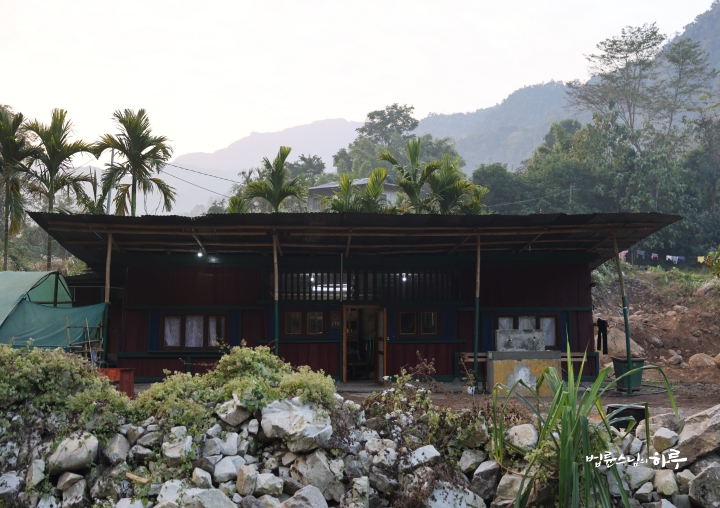
As JTS Bhutan staff primarily work on improving residents’ lives, it’s no exaggeration to say they know the neighborhood like the back of their hand, almost as if they were Pantang residents themselves. Although the travel distance is short, the schedule is tight to cover two schools, so they started the field trip as soon as the sun rose today.
Sunim once again encouraged the volunteers from Pumzol village.
“It seems difficult to spend the winter in Pumzol with the current accommodation. It’s better to finish the ongoing work and stay at the Pantang center for a while, focusing on Pantang tasks first. Then, when the weather gets better, let’s resume the Pumzol project.”
“Yes, Sunim. Please take care of your health during the remaining schedule.”
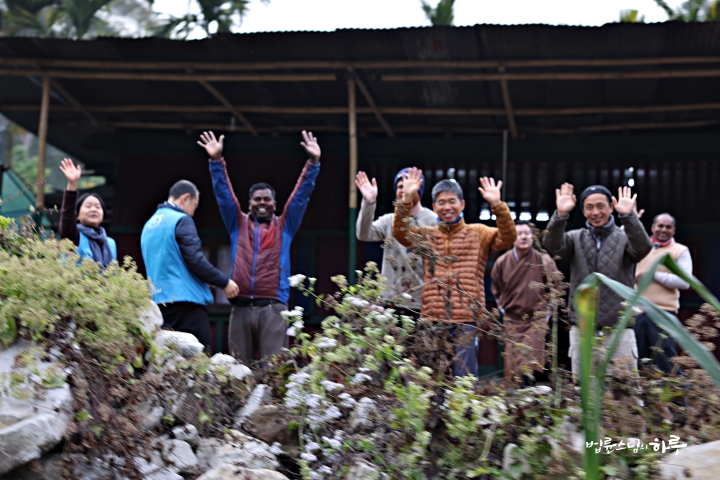
Sunim departed for Tashibi Chiwog at 7:30 AM. The road to Tashibi was mostly along steep cliffs.
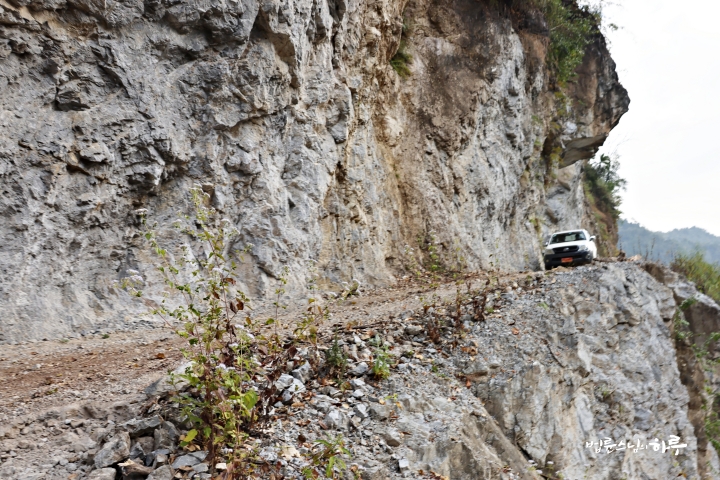
After traveling for two hours along winding cliff roads and bumpy forest paths, the Tashibi temple began to appear in the distance.
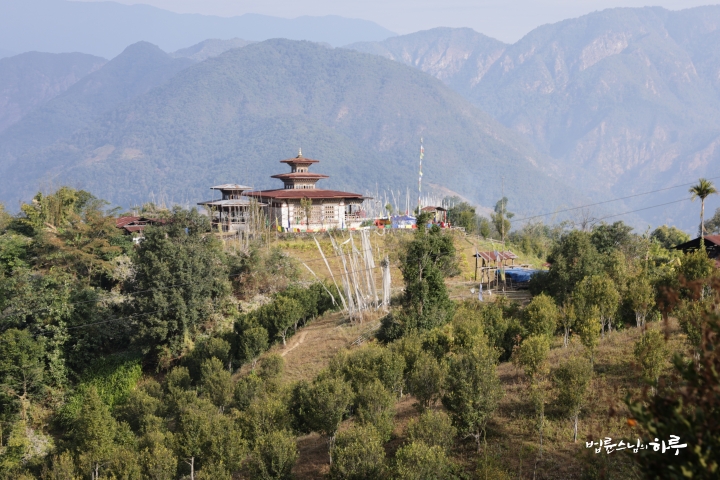
At the entrance of the temple, Governor Zhemgang warmly welcomed Sunim. He was scheduled to accompany the field trip for the next two days from today.
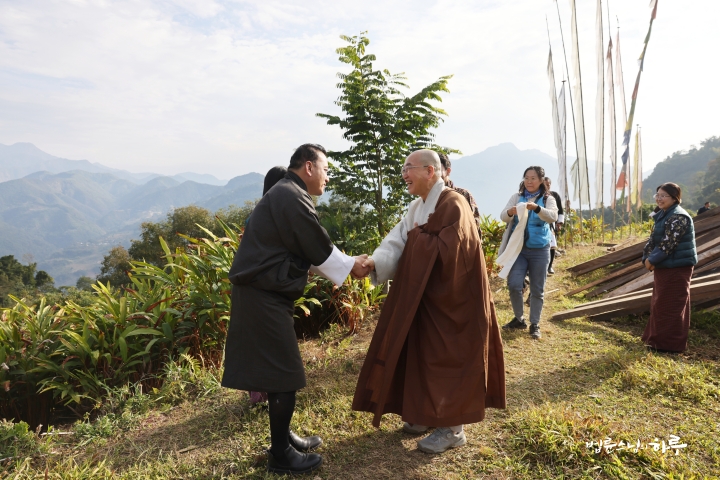
As they entered the Tashibi temple entrance, the sound of trumpets and welcoming greetings from young monks continued all the way to the main hall.
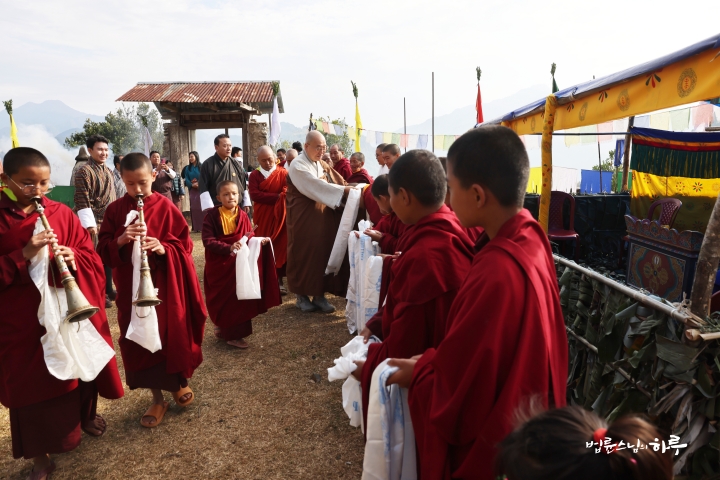
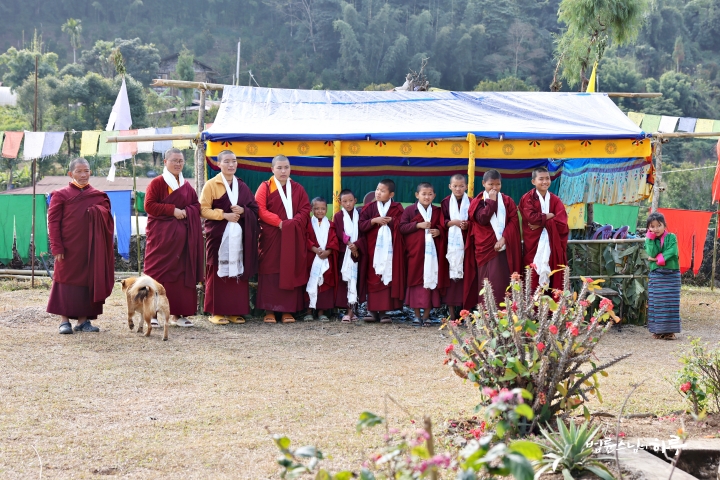
Sunim and the governor moved together to the main hall to pay respects and received a traditional Bhutanese welcome.
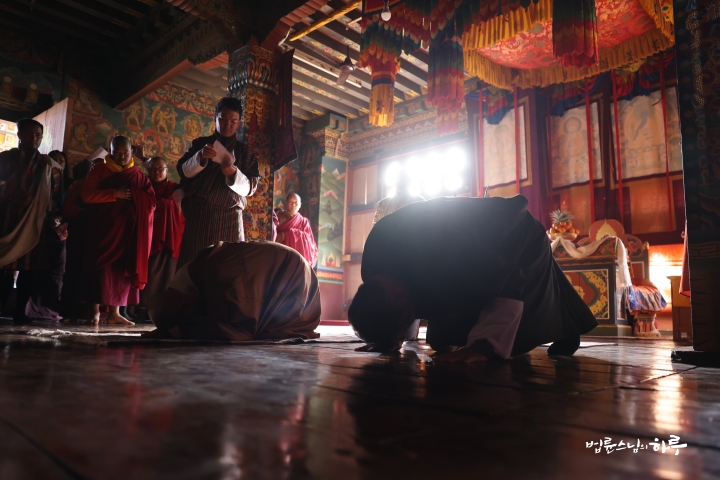
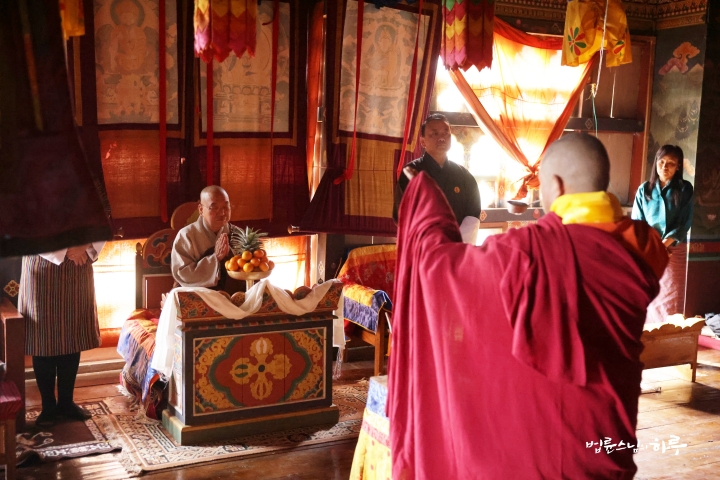
This was followed by a dialogue session with the villagers. The Tshogpa of Tashibi village first provided an overview of the village’s current situation.
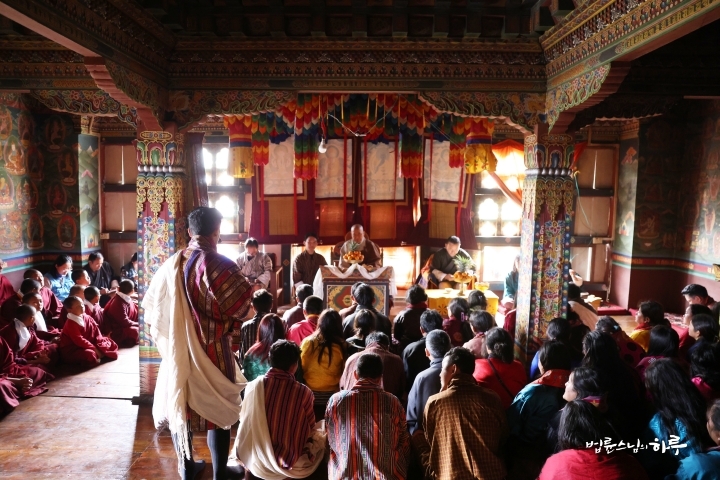
“Thank you, Sunim and Governor, for coming from afar. To briefly describe Tashibi village, we have a total of 71 households, with about 400 people currently living here.
For educational facilities, we have a kindergarten and Tashibi Elementary School, which has about 74 students.
The most important project for Tashibi village is the restoration of the temple. We need a temple, but it’s difficult to receive support due to government budget shortages. The school’s roof is very old and leaking, and the fence needs repair.
The health center also needs fence repairs, and we need a doctor at the health center.
The village also has serious water supply issues.
Since the governor is here, I’d like to make a request to him as well. You must have seen how poor the road conditions are on your way to the village. We’d like to begin road paving before the rainy season starts. I’m kindly asking you this, Governor.
After the Tshogpa had explained all the village’s issues, Sunim also greeted the villagers. He explained in detail why he came to Bhutan and what sustainable development they are trying to implement together.
“We need to categorize the things you need. Building roads or bridges is the government’s job, while repairing our neighborhood or our homes is our responsibility. The government lacks the budget to provide that much support. So, for things you can do yourselves but lack materials, we plan to provide materials if you request them. In this way, we aim to make life a bit more convenient for the residents of Zhemgang and increase your happiness.
That’s why Governor Zhemgang has come along today to hear what you need. After listening to your stories, the government will do what it can, and for parts that can be resolved through material support from JTS, we aim to solve them together with you and JTS.”
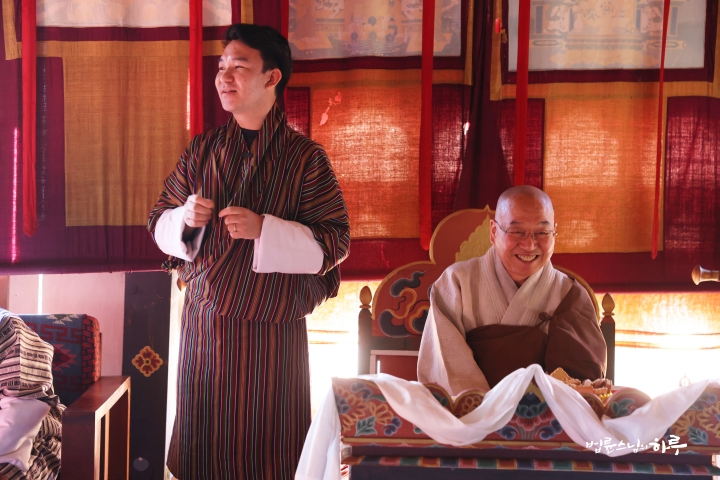
“So, saying ‘Let’s improve the school facilities’ is possible. Anything that says ‘We want to improve this’ is possible. However, saying ‘Please improve this for us’ is difficult. Do you understand?”
“Yes, we understand.”
“Your expressions don’t look like you understand. If anyone has questions or needs, please speak up. I’ll explain more as we talk.”
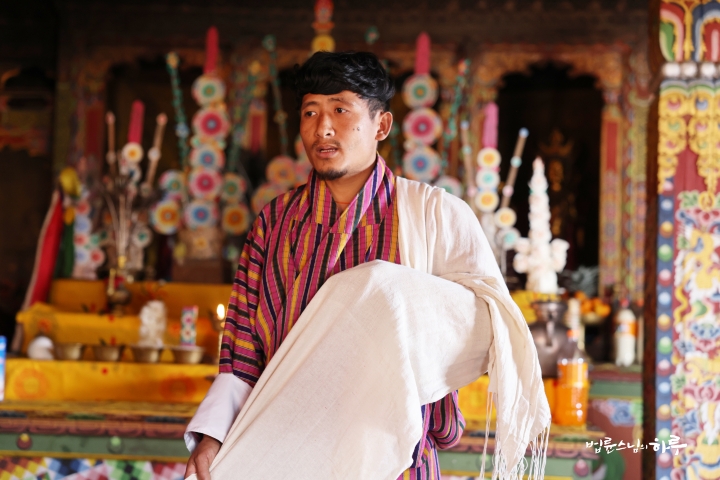
“I don’t have a house. I need a house.”
“In 2023, there was a fire at the temple and part of it burned down. There are many necessary areas such as dormitories, bathrooms, and electrical facilities, and young novices are currently staying at the temple, but the living situation is not stable.”
Sunim once again explained that “improving living facilities within our capabilities” is the priority support project.
Then, the chief monk also spoke:
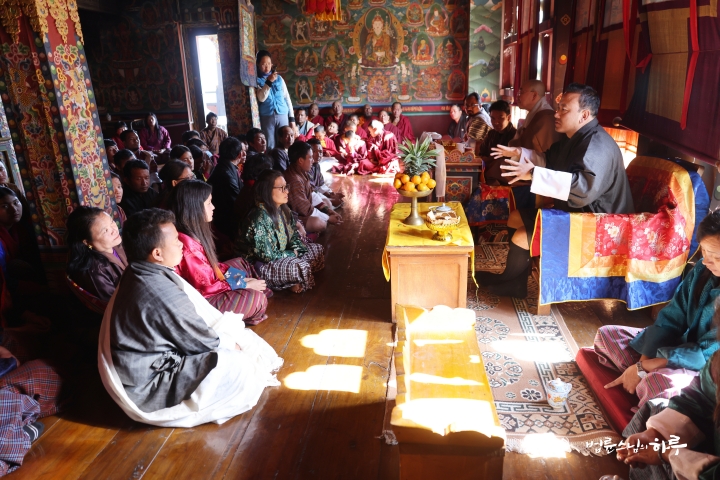
“Among your requests, roads, school dormitories, and health facilities are actually the government’s responsibility. What Sunim supports are the detailed aspects directly related to your lives that the government cannot support. However, Sunim only provides support when you voluntarily decide to do something.
I was impressed by one person’s comment that ‘If Sunim supports me, I will work hard.’ That’s right. No matter who helps, nothing can be solved unless I actively step up.
We are always waiting for the government to do something for us. We wait without knowing how long we have to wait. However, we don’t know when the government will do it. And we don’t know if they can do it or not. Because the country’s budget is not large, they cannot take care of everyone’s circumstances.
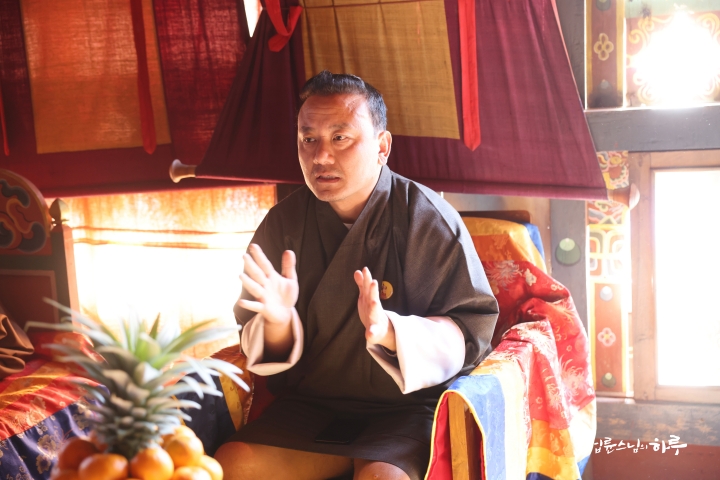
We are a country of GNH (Gross National Happiness). ‘Happiness’ is the goal of life for individuals, and ‘happiness of citizens’ is the goal of the country. However, if our lives are always exhausted and full of demanding thoughts, we cannot increase our GNH.
For our country to develop, our way of thinking must change. We are always waiting for government help. We really need to change this mindset.
It is really important that your lives improve and become a little happier with JTS support. Now, please reduce your alcohol consumption a bit (laughter) and actively take advantage of this opportunity.”
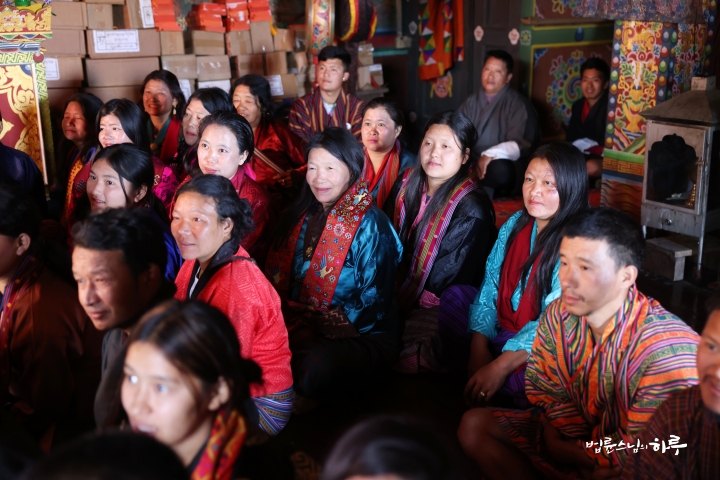
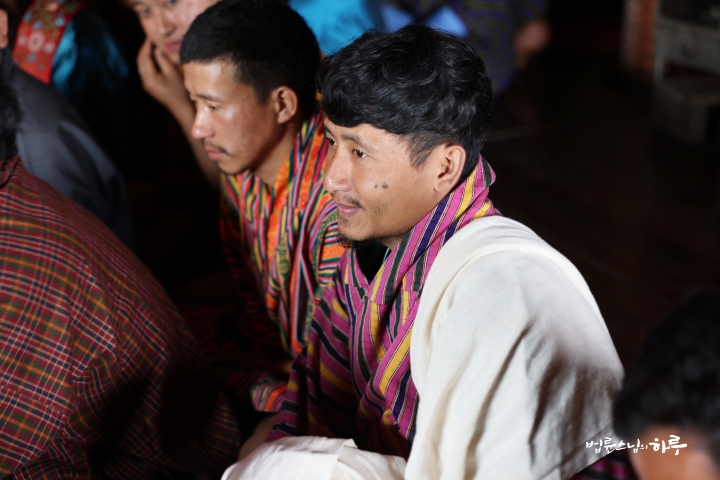
It seemed that Chief Minister Jemgang’s heart was fully conveyed to the people of Tashibi.
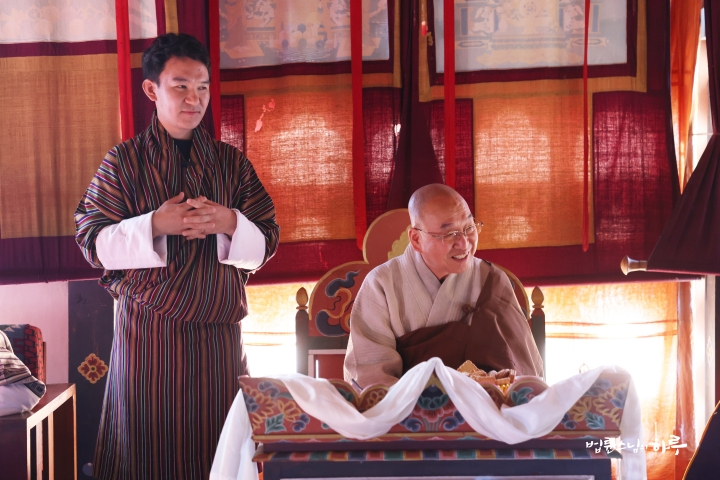
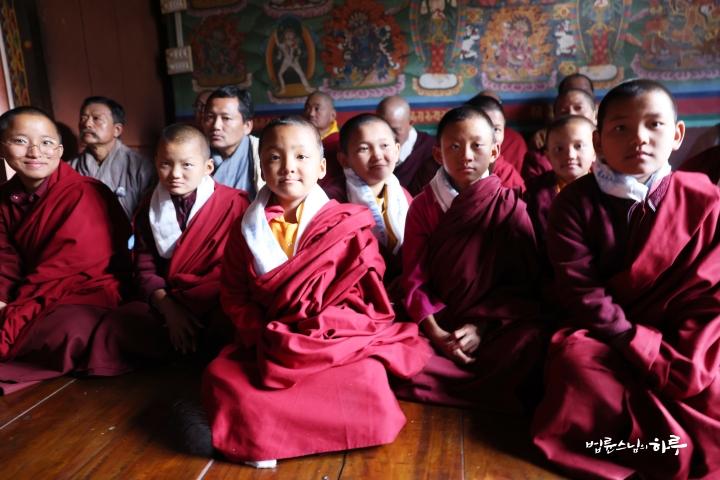
As Chief Minister Jemgang finished speaking, Sunim concluded the dialogue with the Tashibi prople. They came out with prepared gifts.
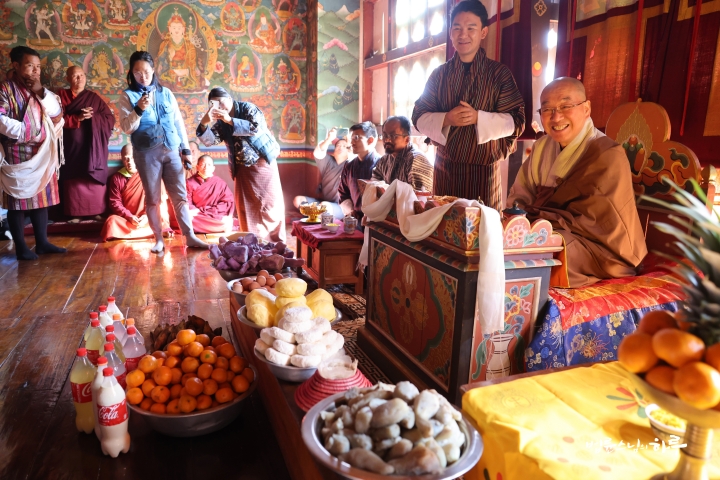
“I have to go on a survey to another place now. I will receive your hearts well. I hope that the villagers will share this gift you gave me today evenly. And I will donate the offering money you gave me back to the chief monk of Tashibi Temple.”
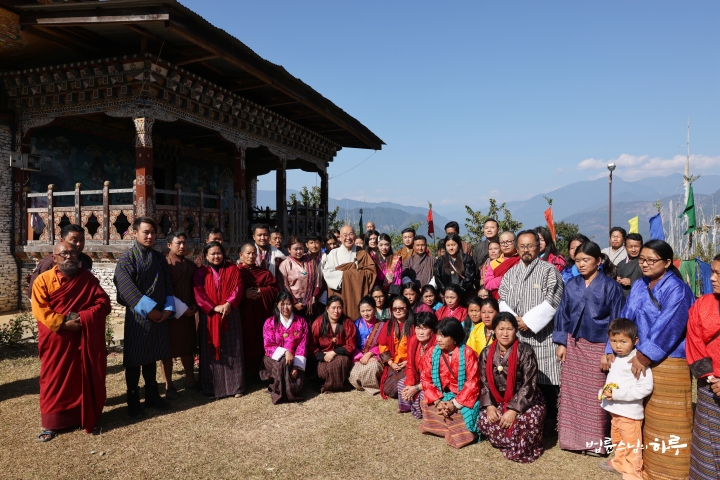
After eating lunch prepared by Tashibi Temple, Sunim moved to Tashibi Elementary School.
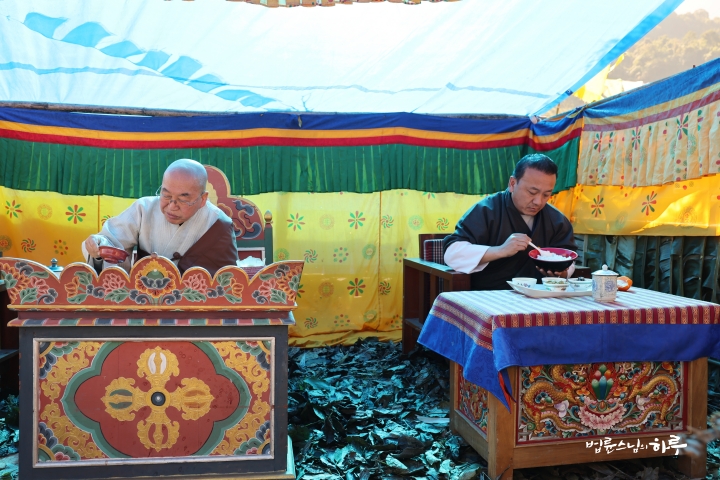
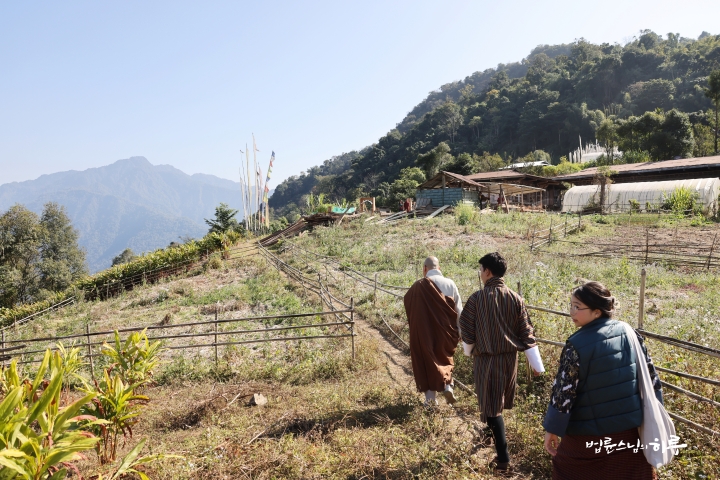
It’s currently the elementary school winter vacation period, so there were no students at the school. The principal came out to guide Sunim.
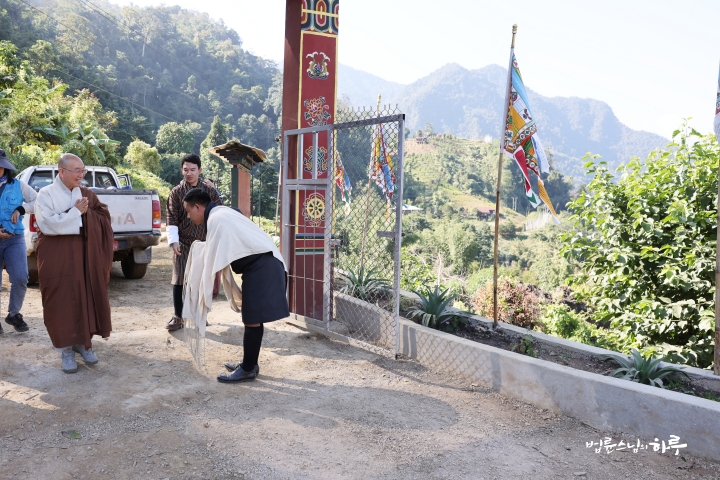
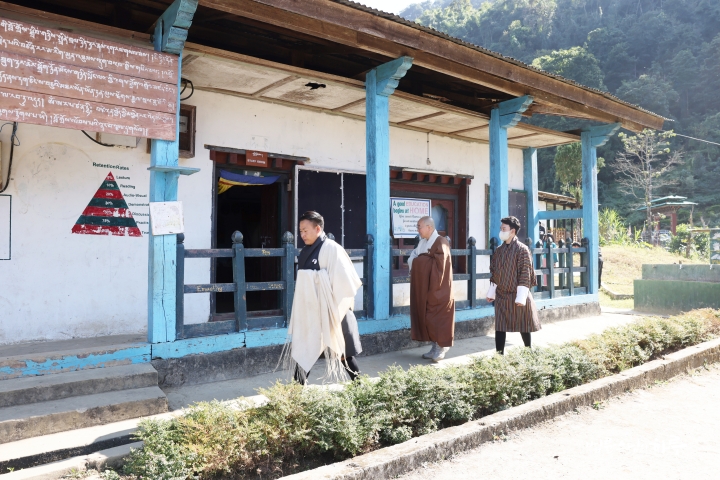
He thoroughly inspected all school facilities including the school library, toilets, classrooms, ceilings, floors, and water facilities.
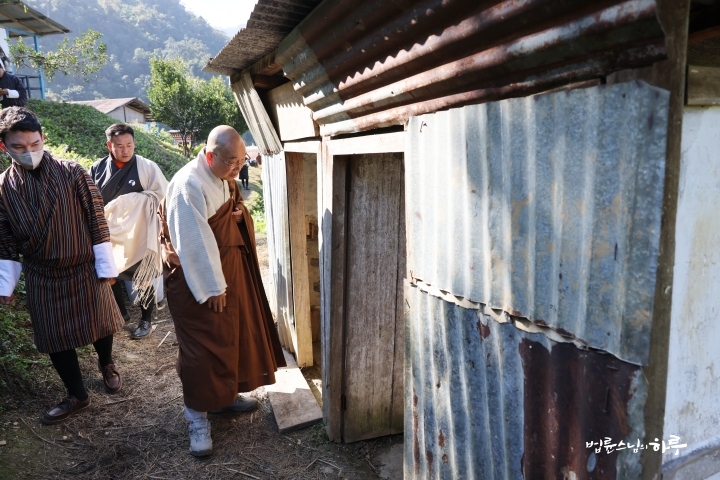
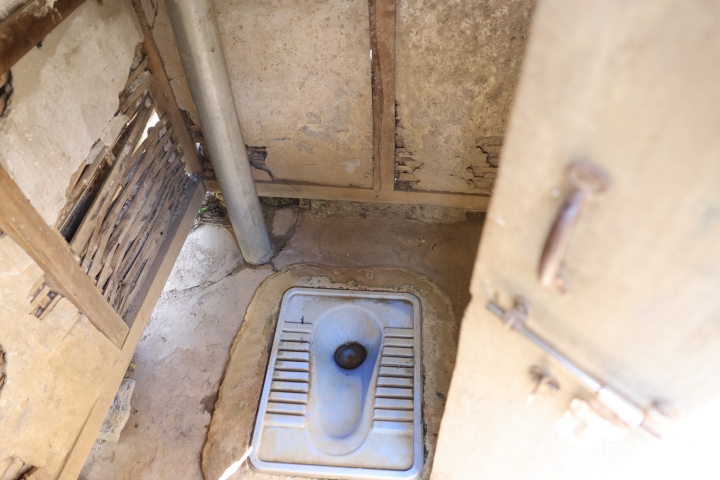
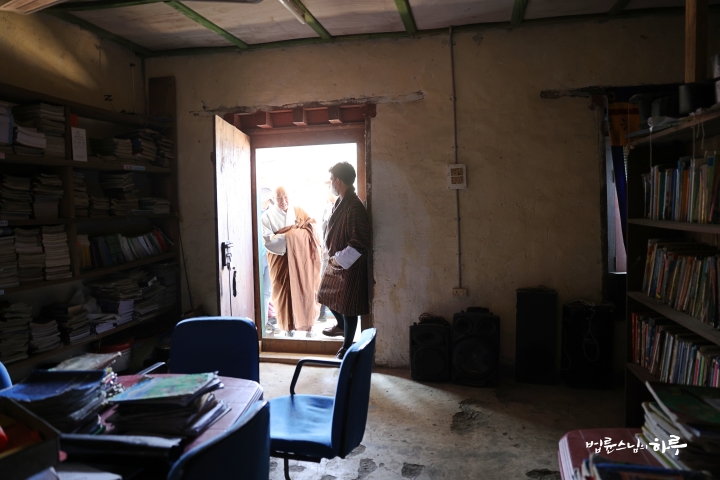
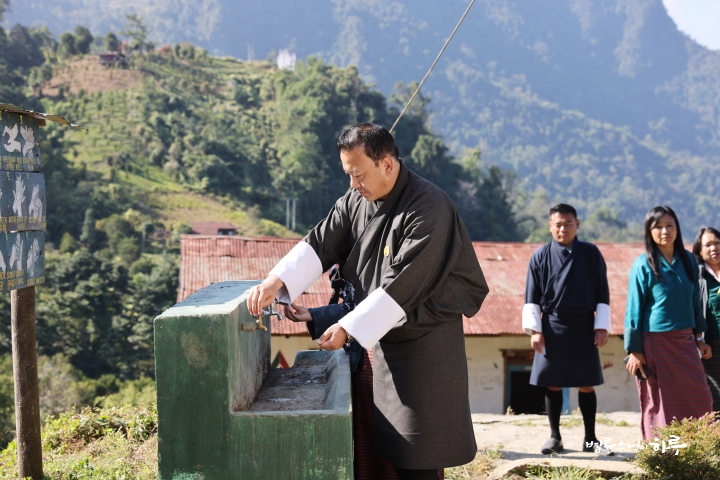
During the dialogue with the residents, someone had requested the replacement of the school roof.
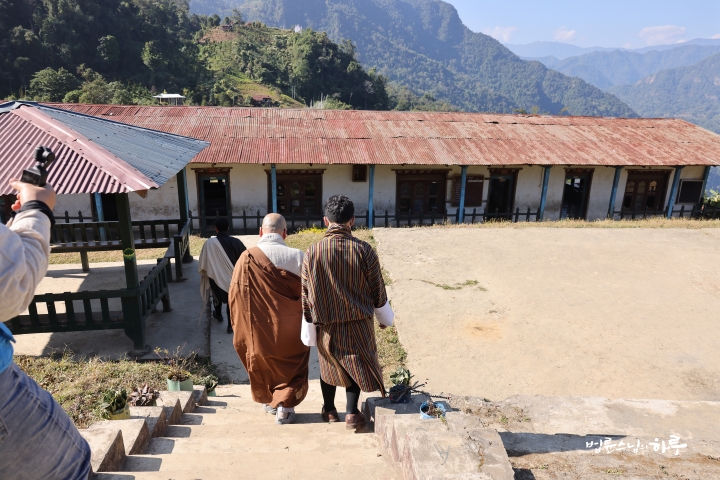
There were indeed many signs of water leakage on the roof.
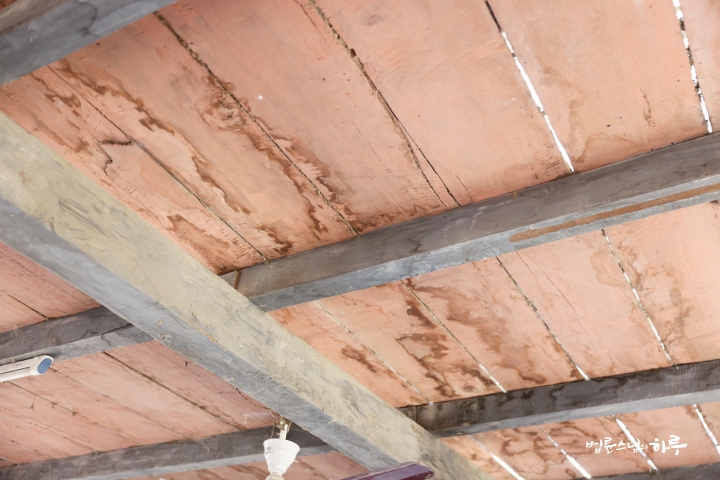
When entering the classroom, the floor was deeply pitted. It was deep enough for children’s feet to get caught when walking. It seems that the sharp parts of the desk and chair legs were directly touching the cement floor.
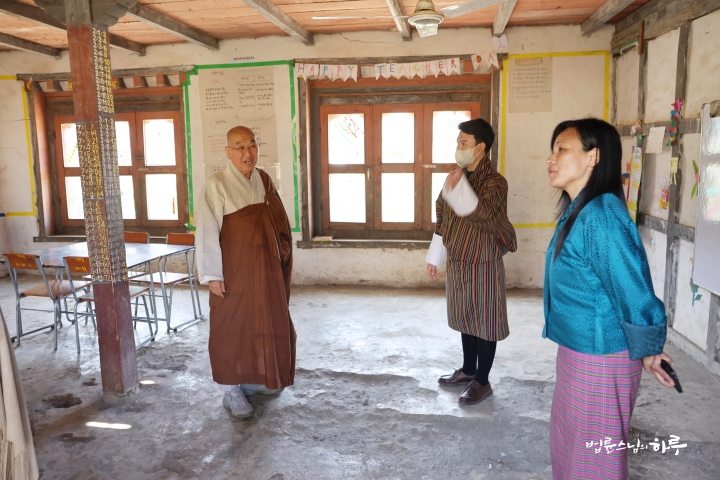
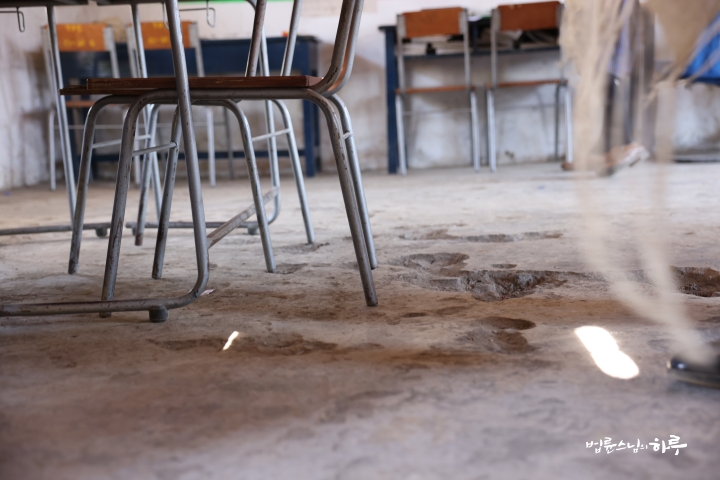
In another building of the school, there were even holes in the ceiling.
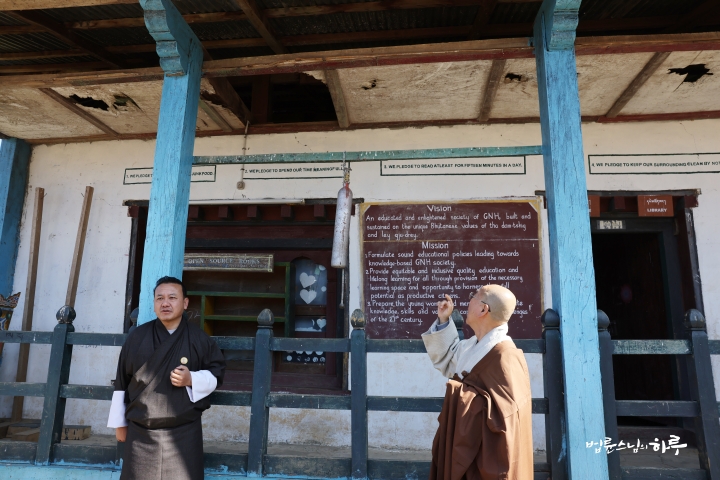
After finishing the school inspection, Sunim moved to Panabi village. On the way to Panabi village, the survey’s staff vehicle broke down. Sunim moved to the location of the staff vehicle, took all the staff’s luggage and the staff, and headed back to Panabi village.
Although they hurried, they arrived at Panabi village much later than expected.
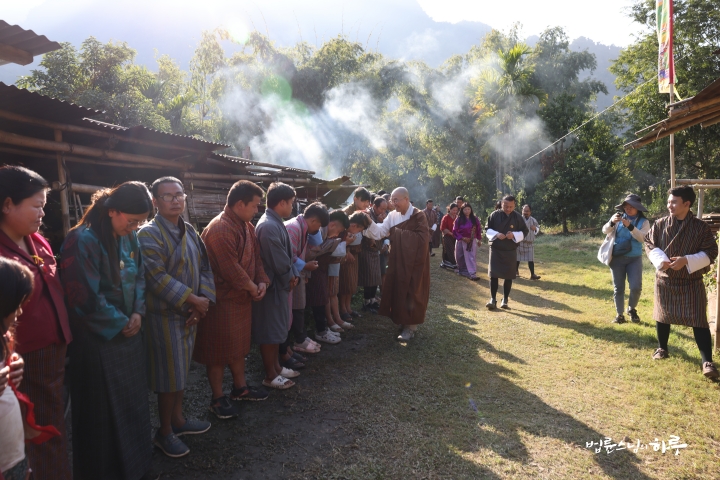
The space they entered thinking it was a temple was surprisingly a temple with partitions installed in a private house.
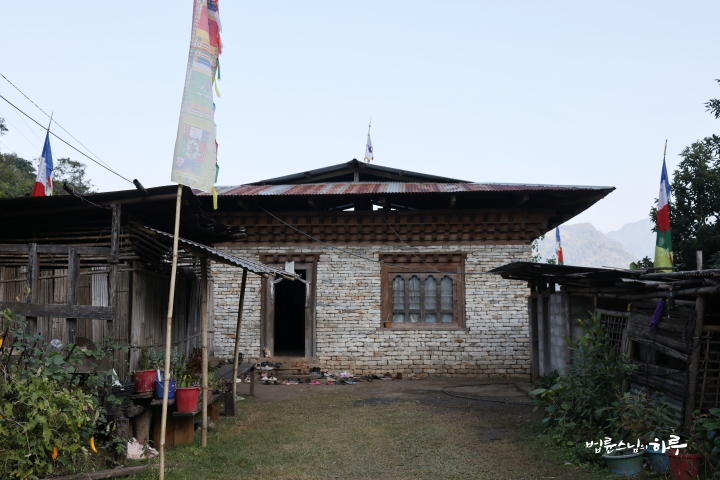
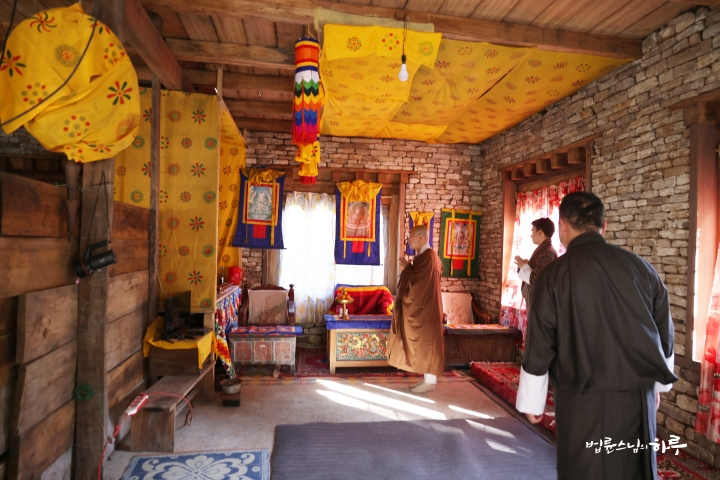
“Sunim, we should install the partitions in this house newly,” the planning officer said with a smile.
After greeting the villagers, Sunim explained about the sustainable development that JTS is carrying out. Then he asked the villagers what they needed.
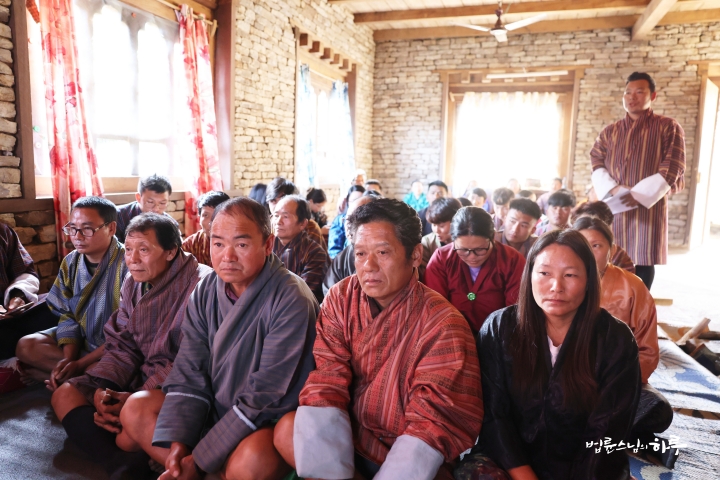
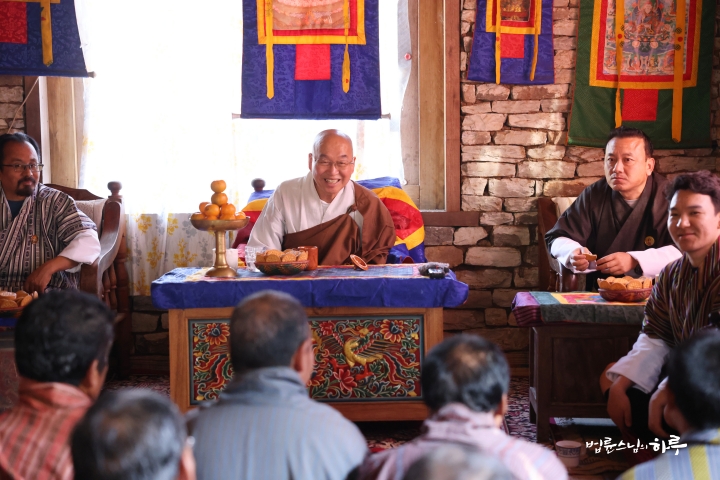
• There is a shortage of drinking water in the village. We want to reinforce the water supply and make a larger water tank.
• We need an agricultural waterway in Neunglong village.
• We need a fence to protect Panabi Chiyok from wild animals.
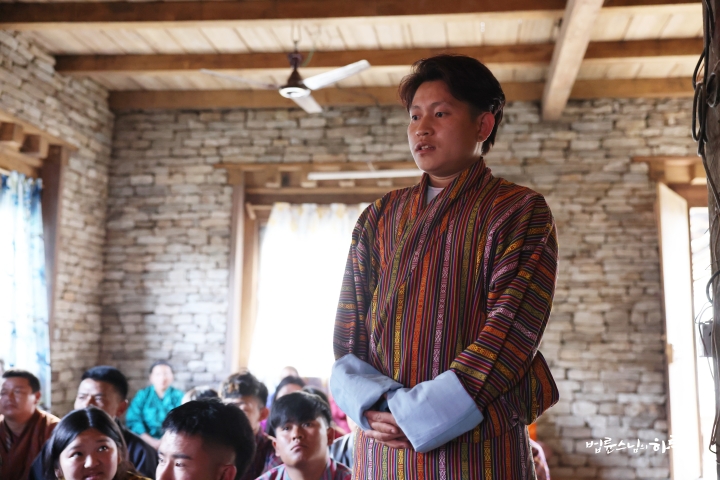
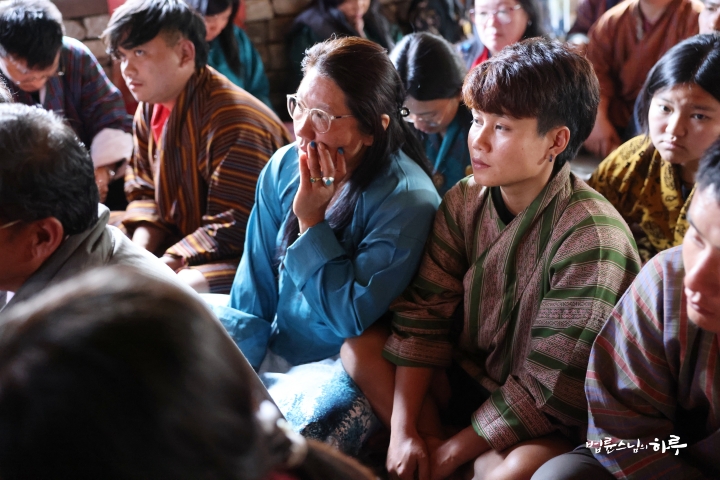
• There are 4 households without houses.
• As you can see, there is no temple in the village. But we really need a temple.
• There is a blind grandmother in the village. She needs a toilet.
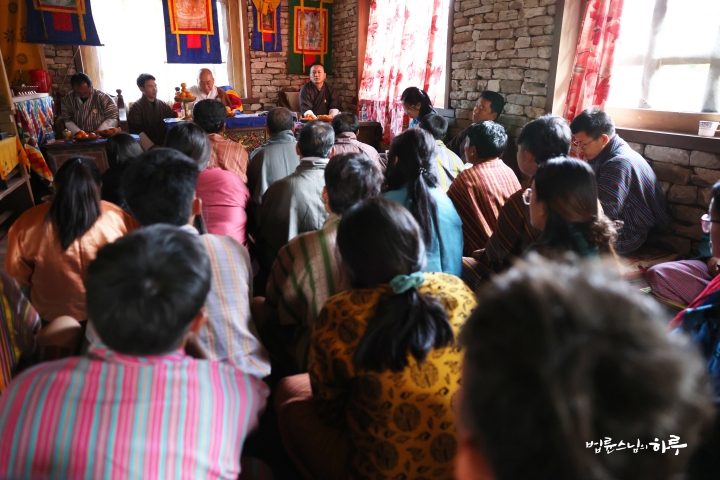
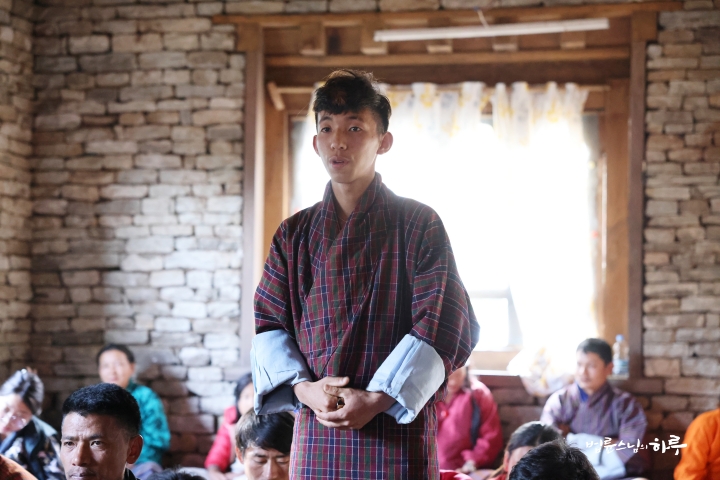
After hearing the villagers’ requests, Sunim again explained about sustainable development with JTS.
“This project is primarily for your happiness. It’s not that there’s no need to build a temple. Things related to your daily lives will be supported first.”
The chief monk also spoke to wrap up the meeting with the Panabi people.
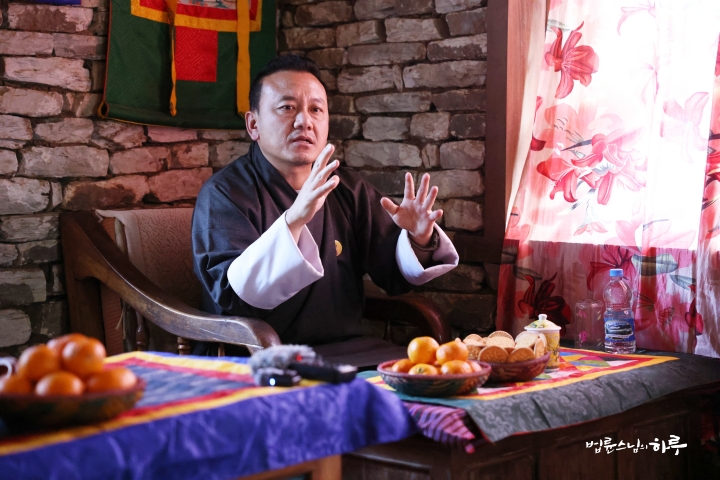
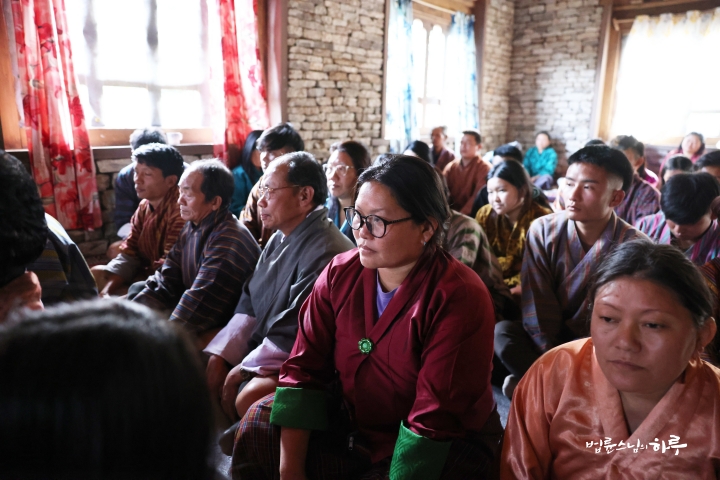
Sunim left Panabi and moved to Pantang Elementary School.
Pantang Elementary School was quite large in scale. After looking around the school once, Sunim asked the chief monk:
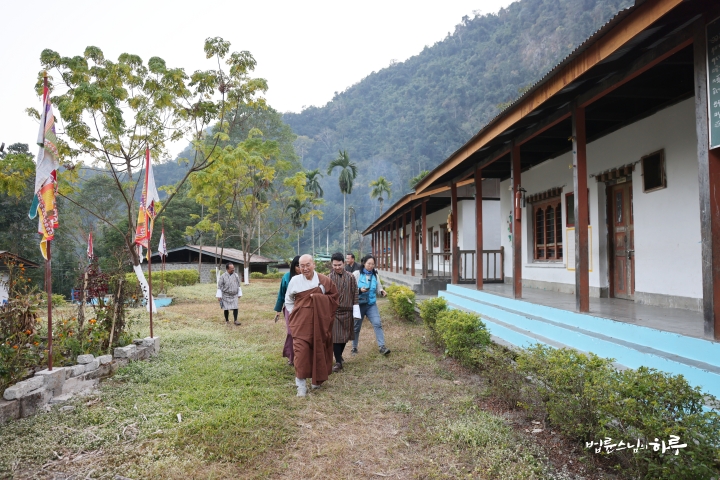
“This place seems too big for the number of students. As the number of students will continue to decrease in the future, is there a need to expand the toilets?”
“Yes, Sunim. This school is currently operating up to 6th grade in elementary school. More importantly, this school is going to grow in the future. Because nearby schools are closing down, students will inevitably flock to Pantang Elementary School soon. Also, small branch schools in the neighborhood are currently only operating up to 4th grade, so students are already using Pantang Elementary School from 5th grade onwards.”
After hearing the chief monk’s explanation, Sunim began a thorough inspection of the school.
He meticulously checked the toilets, lockers, dormitory rooms, school floor conditions, ceiling conditions, and classroom conditions.
“They requested to expand the toilets, and if necessary, it can be done, but in my opinion, for the boys’ toilet, just add two more urinals to the current setup. Rather, it would be better to expand the girls’ toilet to twice the number of boys’ toilets. Usually, girls take longer to use the toilet than boys.
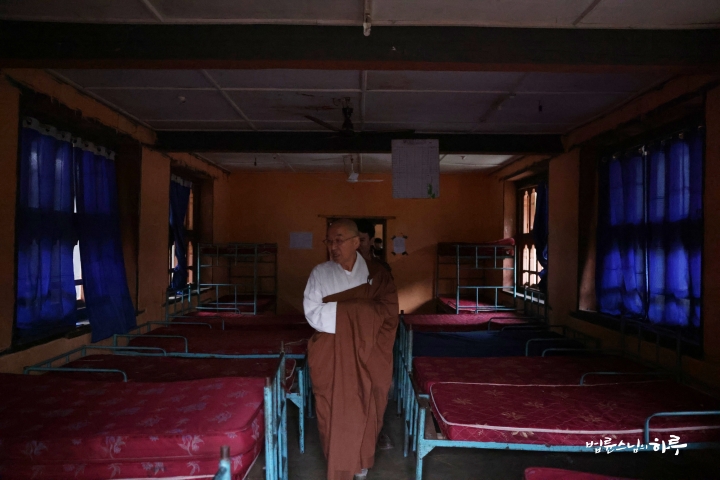
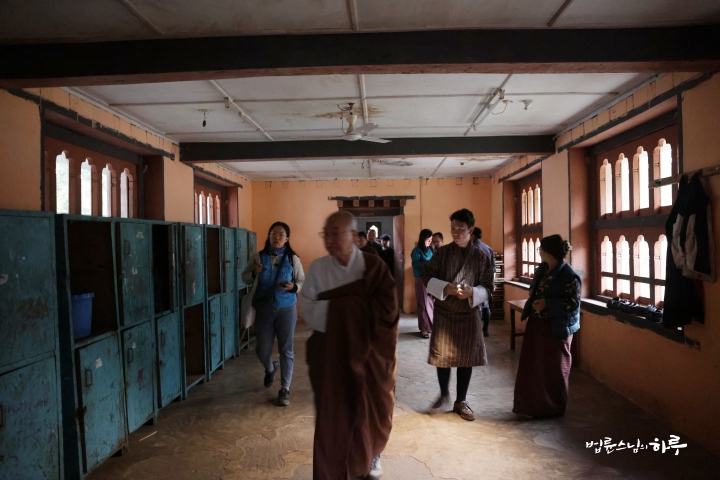
For boys, increasing the number of urinals in the existing space would be better in terms of space utilization than increasing the number of toilet stalls.”
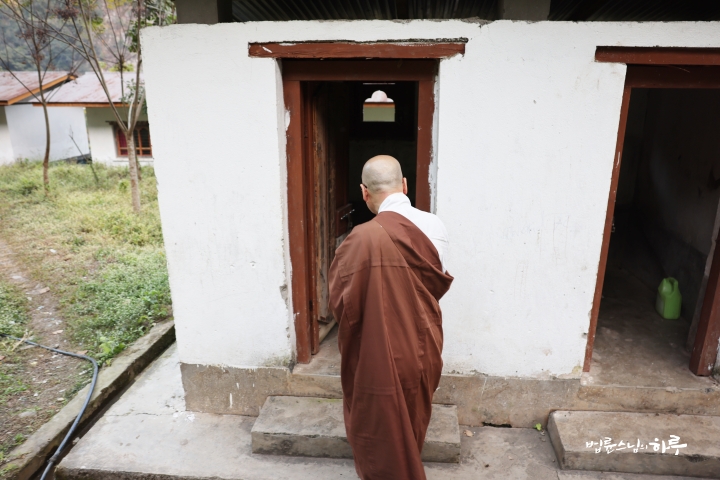
“However, there’s no entrance for children to go from the playground to the classroom. The design is inconvenient. The waterway here is too wide and dangerous for children to cross. Please install a trench cover.”
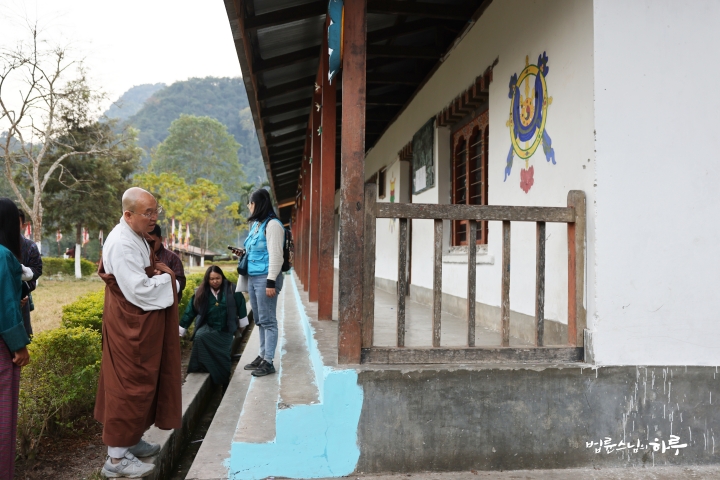
Sunim spent about 30 minutes inspecting the school and discussing in detail with the staff about how to repair the school while moving around.
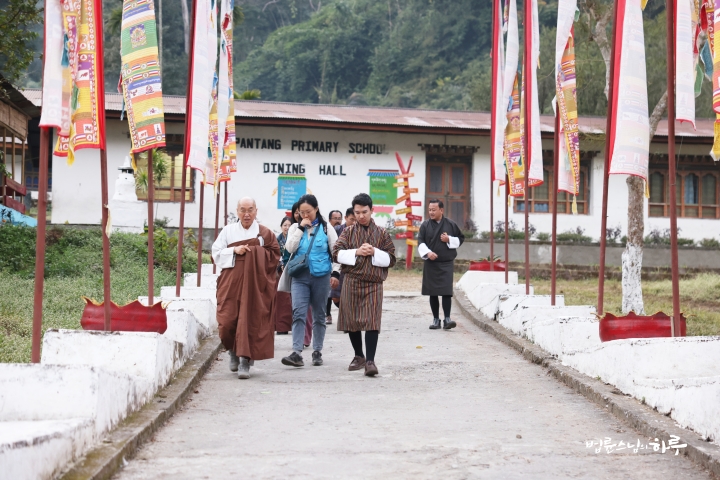
At 5:30 PM, Sunim arrived at the Pankalgaok meeting hall.
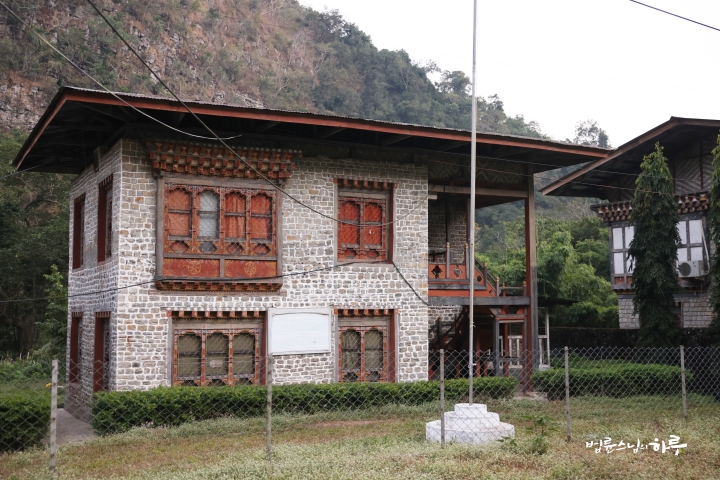
About 20 residents of Pantangchiok were present.
“I’m very late. Our first visit today was scheduled for Tashibi, but it took longer than expected to get there. Then, we surveyed Pantang Elementary School before it got dark, which caused further delay. I apologize.”
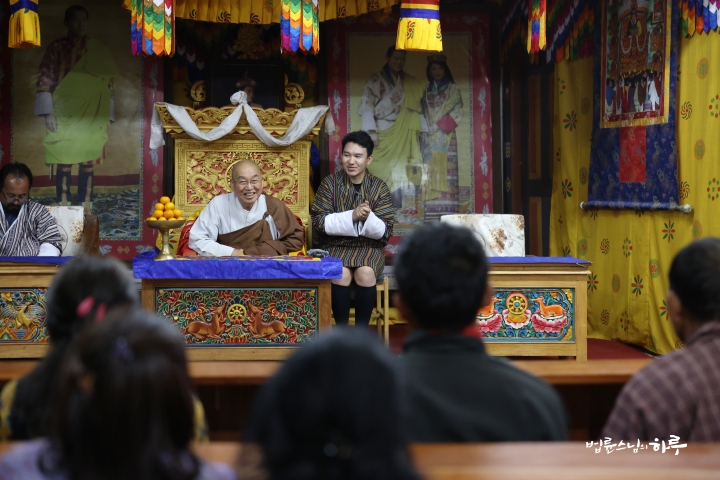
How to Achieve Bhutan’s GNH (Gross National Happiness) in Reality
“Bhutan is a country that values the Gross National Happiness index more than material indicators. Countries with high material indices may look good, but people aren’t necessarily happier. For example, South Korea ranks 28th in GDP per capita. When you visit Korea, you might think all the facilities are really well-developed. However, their national happiness index ranks 118th, much lower than Bhutan’s.”
“So, when foreigners come, they say ‘Wow!’ when they see the airport or highways, but when they look at people’s faces, they see frowns. Firstly, people are impatient and easily irritated, and because they’re greedy, they complain a lot. They have strong opinions, which leads to conflicts with others. That’s why my work in Korea involves reducing the conflict index and increasing the happiness index.”
“That’s why the 4th King of Bhutan said that human well-being cannot be expressed by material indices alone. He stated that the standard of how well people live should be the Gross National Happiness (GNH) index. As a result, although Bhutan was poor, it was once the country with the highest happiness index.”
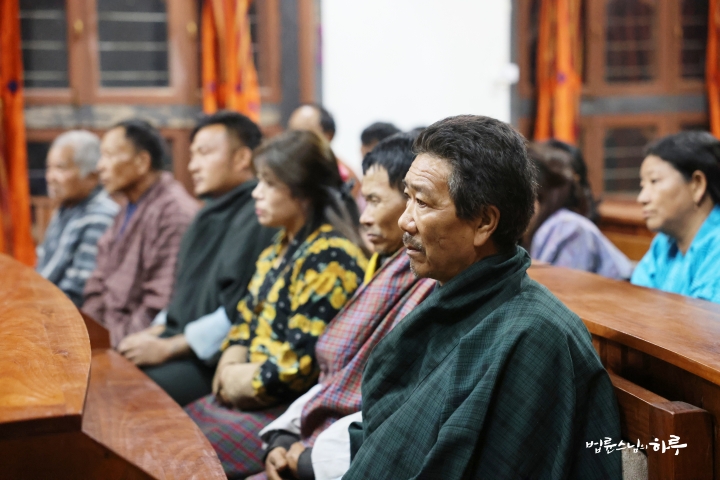
However, Bhutan has changed now. Bhutanese people have become greedy and are trying to increase their material index. This seems to be due to TV and smartphones. As a result, young people in rural areas want to move to cities, and those in cities want to go abroad to places like Australia or Canada.
But what would they do in Australia? Most of them end up doing cleaning or restaurant work. They might earn a little more money, but they’re not happy. Although they receive higher wages in Australia, living there is expensive, so they have to struggle to make ends meet. When they think about returning to live in Bhutan, they find the salaries unsatisfactory. So they end up in a situation where they can neither stay nor leave. They might build a big house in Bhutan with money earned in Australia, but then they have nothing to do in Bhutan.
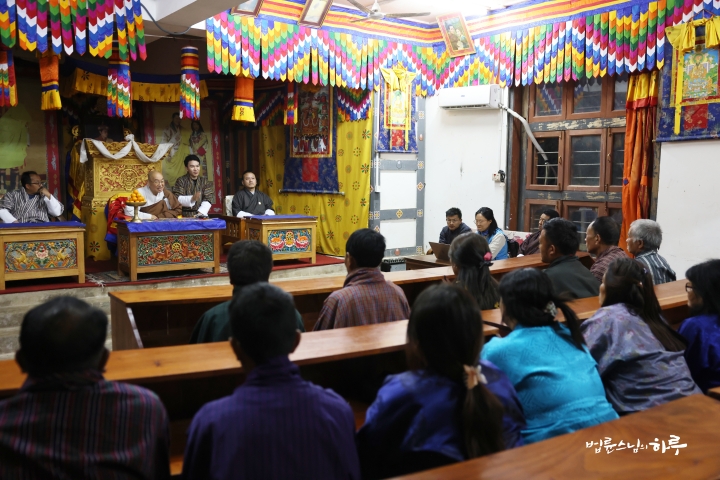
The reason I’m saying this is because they’re not happy. So we need to find ways to live happily within Bhutan. As you know from experience, life isn’t happy when it’s too inconvenient.
‘The kitchen is inconvenient. The bathroom is uncomfortable. The water supply is poor.’ Young people find these things more inconvenient than older people. So we need to improve living conditions.
We should build houses for those who don’t have them, renovate the interiors of existing houses that lack proper facilities, construct fences and irrigation systems for farming, and repair old school facilities.
We may not be rich, but we should have clean and convenient living conditions. This way, we can live a happy and comfortable life despite being poor. It’s our constant desire for more that leads to climate crisis and environmental problems. In the future, many social issues will arise from problems like ‘lack of rain, reduced river flow due to melting glaciers, and extreme heat.’
However, people in Bhutan don’t feel these climate crisis effects much yet. You might not notice it now, but if glaciers continue to melt in Bhutan, river flows will decrease, which will first cause problems for Bhutan’s hydroelectric power generation.
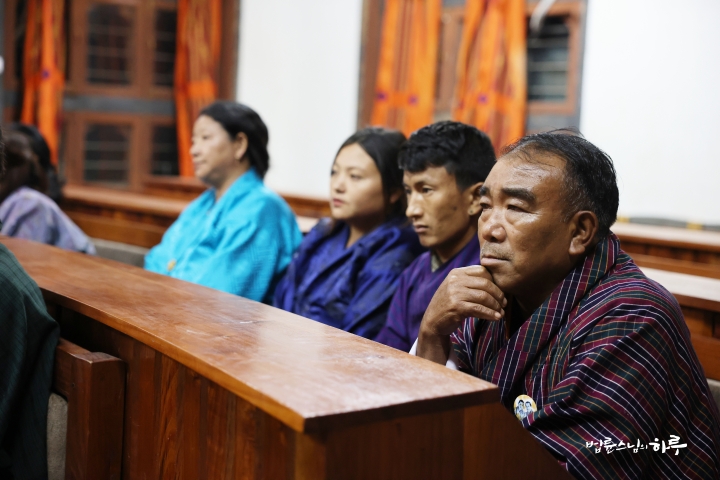
The problem lies in our thinking that living well means producing and consuming more. Envying those who consume a lot is not something to emulate.
However, if it’s too inconvenient, it becomes difficult to live. We’re not saying to live like wealthy foreigners, but to improve our own lives. The government can’t do all of this for us individually. We each have to do it ourselves. Developing the village is also something the villagers themselves must do.
Now, you might say, ‘We don’t have money to buy materials for repairs.’ In that case, we’re saying we’ll provide the materials so you can make improvements to live more comfortably. The goal is to increase your level of happiness.
The government will handle big projects like building roads and expanding medical facilities, while you work on improving your own living conditions.
That’s why we’ve gathered here today to meet with you.
Do you want to make some improvements to your lives? Or do you prefer to continue living as you are now?”
“If you provide support, Sunim, we will do the work. Please give us the materials and ideas.”
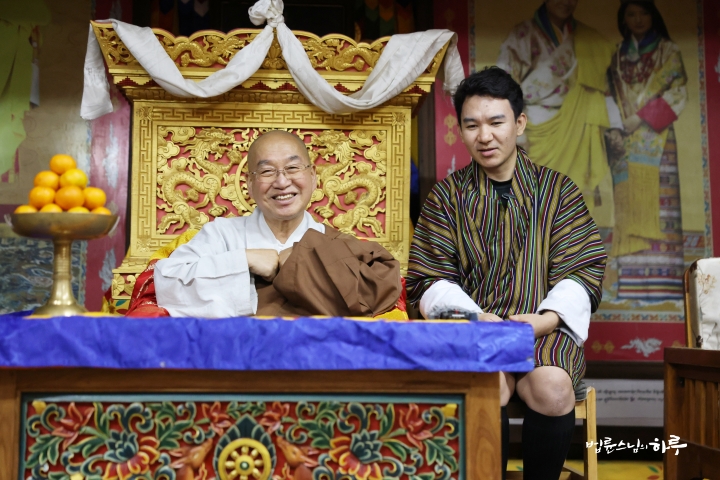
“(Laughing) Yes, you understand well. Let’s do that. I’m not doing it for you, but suggesting we do it together. If there are technically difficult issues, engineers from Zhongka will be sent to teach you the skills.”
After Sunim finished speaking, people didn’t leave their seats.
“Alright, it’s late now. Please go home.”
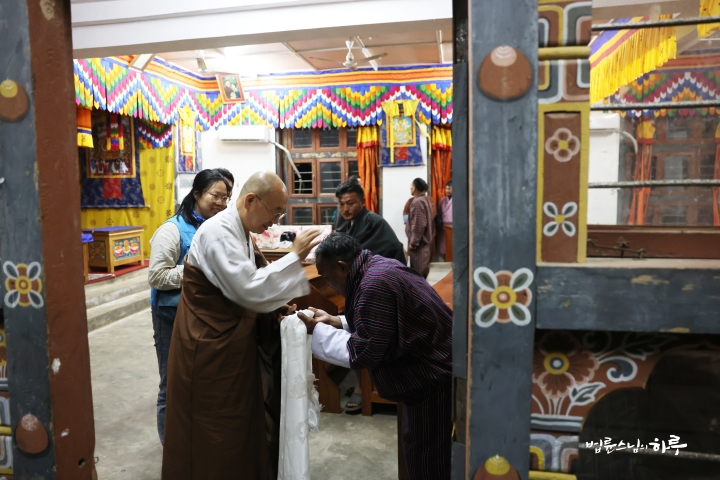
Sunim had dinner at the Phankal Gyeok Meeting Hall while talking with the Governor.
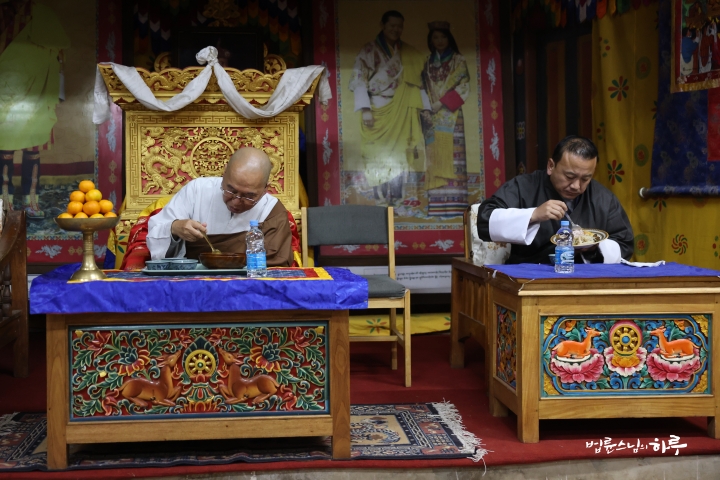
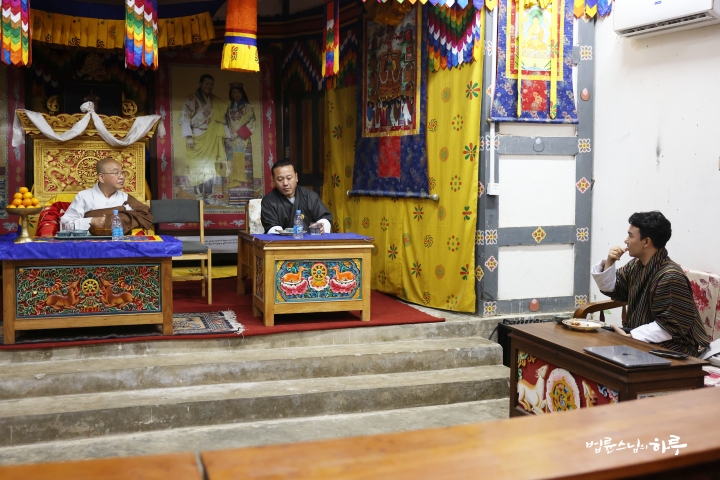
“Governor, there’s a JTS center nearby in Pantang. From now on, JTS volunteers will stay there and carry out projects in the Pantang area. Please stop by briefly to take a look.”
“Yes, I will do that.”
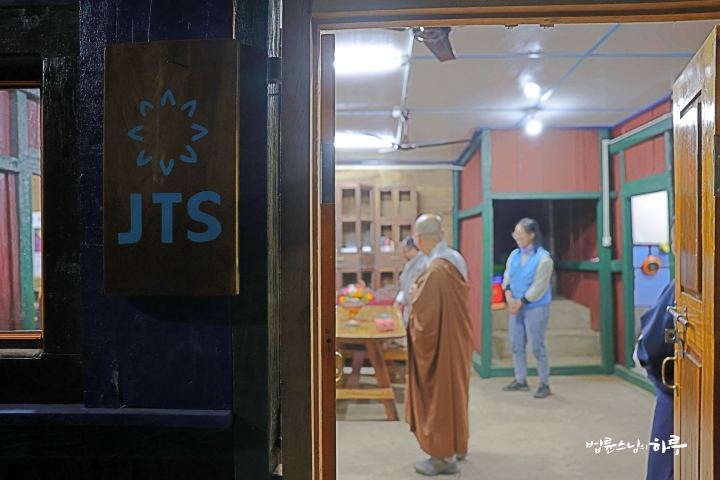
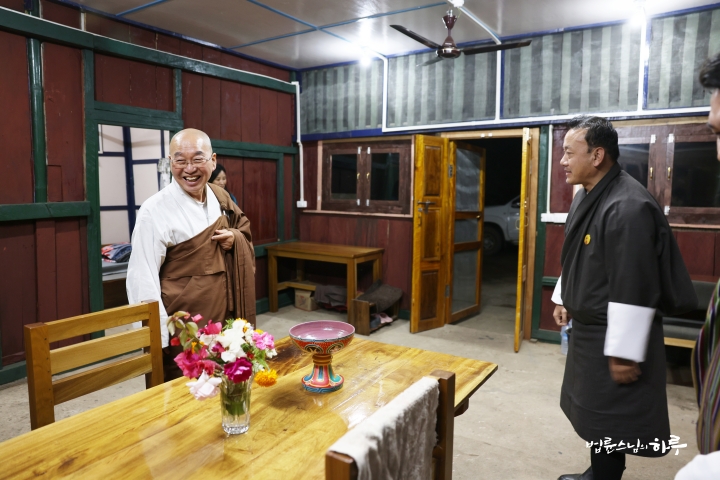
After dinner, Governor Jemgang, the planning officer, Mr. Lee from the central government, and other Bhutanese officials who had been part of today’s schedule all arrived at the Pantang JTS Center.
Originally, this place was close to being a warehouse as it had not been used for a long time. At first, the idea of renovating it seemed daunting, but when it was decided to create a JTS center here, the staff thought, ‘Let’s create a model for house repairs in Bhutan ourselves.’
Soon, with the hearts and sincerity of various volunteers from Korea and abroad, a kitchen was built, a living room was furnished, water and electrical facilities were installed, tables were made by hand, and accommodations were set up, creating the ‘Pantang JTS Center’.
The Jemgang officials, in particular, were amazed because they knew the state of disrepair the space had been in.
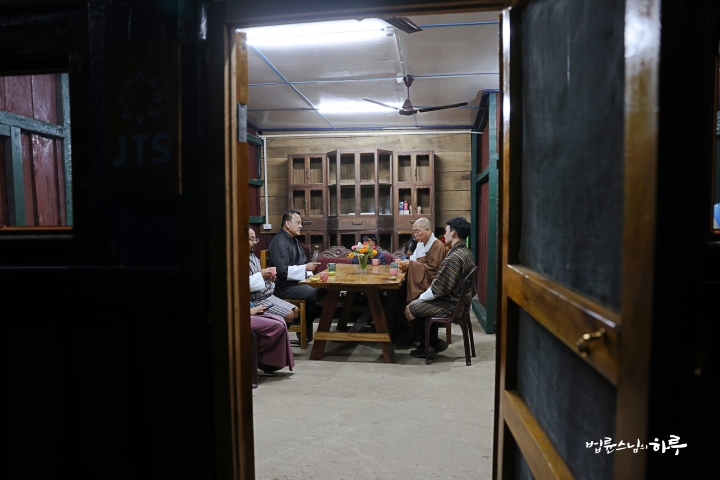
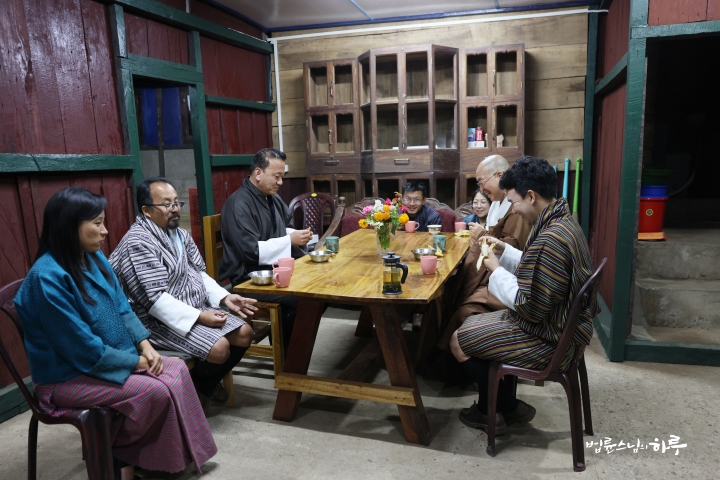
Everyone sat in the living room, had tea together, briefly discussed tomorrow’s schedule, and then parted ways.
It was a long day today. Sunim also retired early for rest.
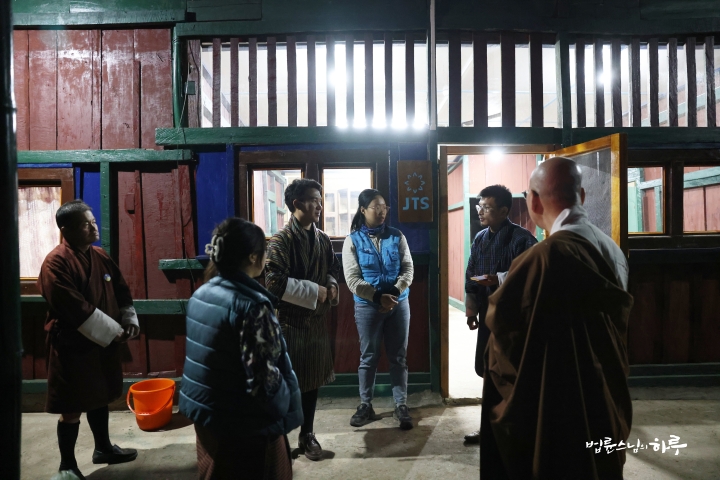
Since there was no Dharma talk today, Here is a Dharma Q&A from the Happiness School special lecture on October 5th.
I’m Hesitant About Marriage Because I Can’t Have Deep Conversations With My Boyfriend
“This issue depends on how much you demand from your spouse, not on the age difference. Do you want to have philosophically deep conversations, profound discussions about future civilizations, practical and in-depth talks about changing our society, or artistically deep conversations? The range of deep conversations is incredibly wide, isn’t it? If you were to live with Venerable Pomnyun and wanted to have deep conversations about music or art, do you think it would work well? If you wanted to talk about sports like baseball or soccer while living with Venerable Pomnyun, would it go well? Even if you tried to have in-depth conversations about travel, saying ‘This beach is nice,’ it probably wouldn’t work well with Venerable Pomnyun. If you tried to discuss which coffee tastes good, which tea is delicious, which wine is best, or which jewels are nice while living with Venerable Pomnyun, the conversation wouldn’t happen at all.
The question is, what topics do you want to have deep conversations about with your partner? If you want to discuss all areas of your interest with your spouse, you probably won’t be able to choose a partner. It’s not a problem with your boyfriend; such a spouse simply doesn’t exist. While Venerable Pomnyun might seem knowledgeable in many areas, if you try to talk about specific topics together, it often doesn’t work well. If you talk about subjects Venerable Pomnyun isn’t interested in, he’ll either doze off or complain that it’s useless talk.
But can the fact that your spouse doesn’t know much be a reason not to live together? If someone can have somewhat socially meaningful and deep conversations, that person is likely to be not very fun and always serious. If you ask such a person who seriously talks about political situations or education to go on a trip, they might respond, ‘How can we waste car fuel on a trip in this climate crisis era?’ If you suggest buying something, they might react, ‘Didn’t Venerable Pomnyun say to reduce consumption? How can we increase it?’ Would living with such a person really be good for you?
It’s not right to demand everything from your spouse. If you think there’s one important value that you and your partner should be able to empathize with and have deep conversations about, despite other differences, then you should find someone who can do that. You might also think that someone who is diligent and can keep promises is the most suitable as a spouse, or you might think it’s okay if they’re not like that. Because everyone has different tendencies, it can vary depending on what demands you make of your spouse.
Let me give you an example. This is something that actually happened. There was a man in our society who graduated from the best university, got a job at what’s considered the best company, and came home to be with his family as soon as work ended. To his family or anyone else, he seemed like a very good husband. But his spouse was in agony, saying she couldn’t live with him. She wished her husband was someone who enjoyed walking along the beach on rainy days or winter days, savoring the melancholy and having a cup of coffee together, but her husband wasn’t like that at all. When she suggested going out for a cup of coffee, he would say, ‘Why go out when we have coffee at home?’ When she wanted to go out on a rainy day, he would say, ‘Why go out in the rain when there are clear days?’ She said they couldn’t communicate at all. When she considered divorce, her family was in an uproar, saying they couldn’t understand why she would leave such a good husband. But later, it turned out she did divorce. She met a man who could really sit in a coffee shop on a rainy day, drinking coffee and looking outside together. He didn’t have a good educational background, didn’t have a good job, and didn’t earn much, but they got together just because one preference matched, and eventually, the family broke up. While her family was in an uproar saying she threw away her rice bowl, who can say what’s good? The family’s values and this woman’s values were different. So, regardless of what others say, you can only live according to your own values.
You shouldn’t force your values on your partner either. If there’s one thing in your values that you think should be somewhat similar, you should tell your partner in advance and set your own principle that you won’t marry no matter how rich or kind they are if it doesn’t match. If not, you should set a principle that you won’t consider such things in your spouse. You mentioned that your boyfriend is young, but if he’s in his late 20s, that’s not a young age. It doesn’t seem to be a problem caused by his young age. You said that as a condition for marriage, your partner should be interested in what you’re interested in and be able to have deep conversations, but that’s impossible. No one can be like that.”
“Thank you for your words, Sunim. I tend to want to move in a progressive direction, and I felt a bit frustrated that I couldn’t have such conversations with my boyfriend. As you said, he’s a person who is content with reality and grateful for it. But I think I overlooked that aspect and only thought about what I wanted.”
“I don’t mean your thoughts are wrong. If you want to do things your way, you need to change your partner. Marriage is about living together, so you shouldn’t force your way. Of course, you would only meet someone who agrees with the life you aspire to. Otherwise, you wouldn’t meet at all. So it’s up to you to decide. If you prioritize certain things, you should meet someone who has those qualities. If not, and you prioritize the person, then you shouldn’t insist on what you consider important.”
“Thank you.”
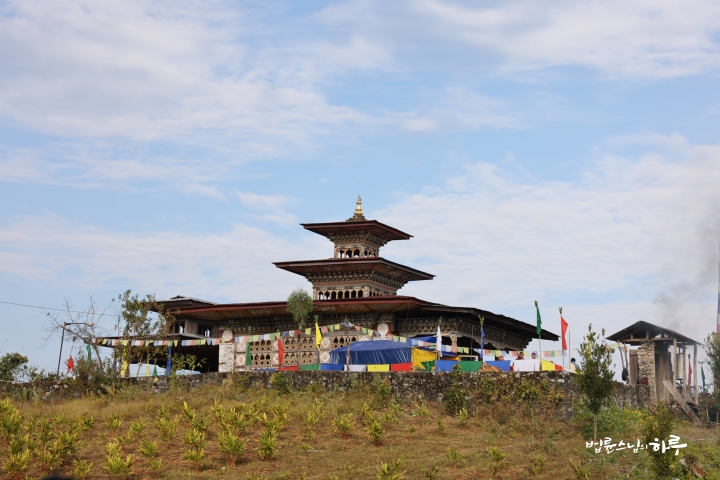
“





Thank you, Sunim. Thank you for the post. I hope you’ll all take good care of yourselves.